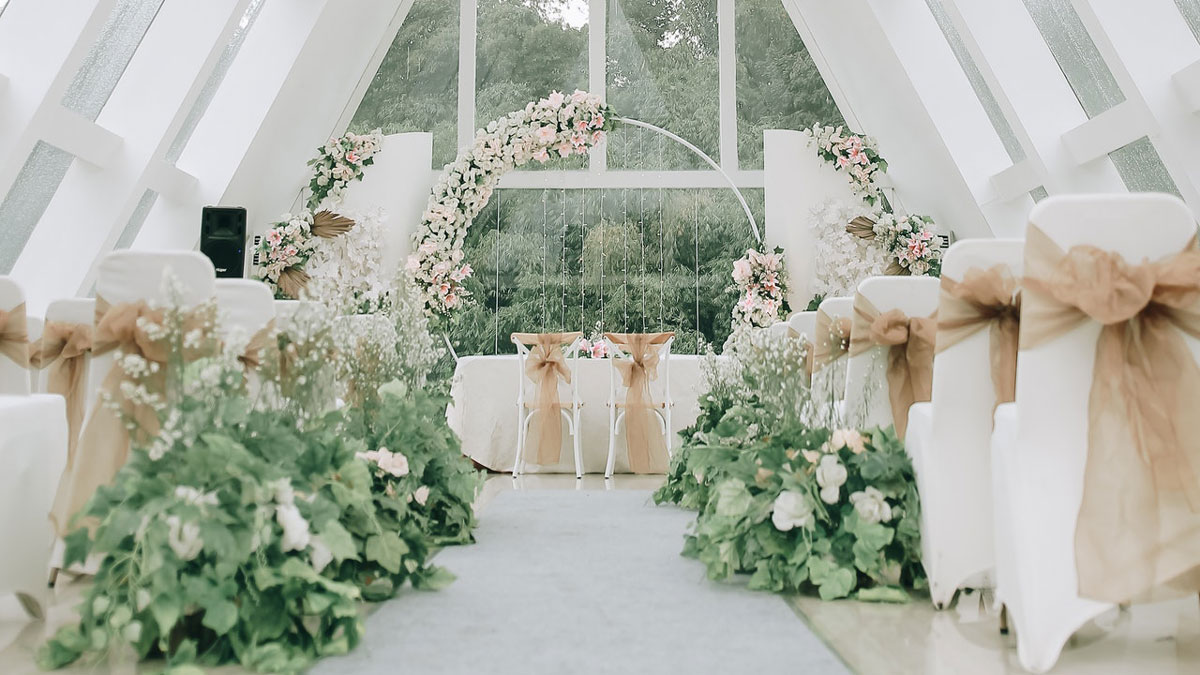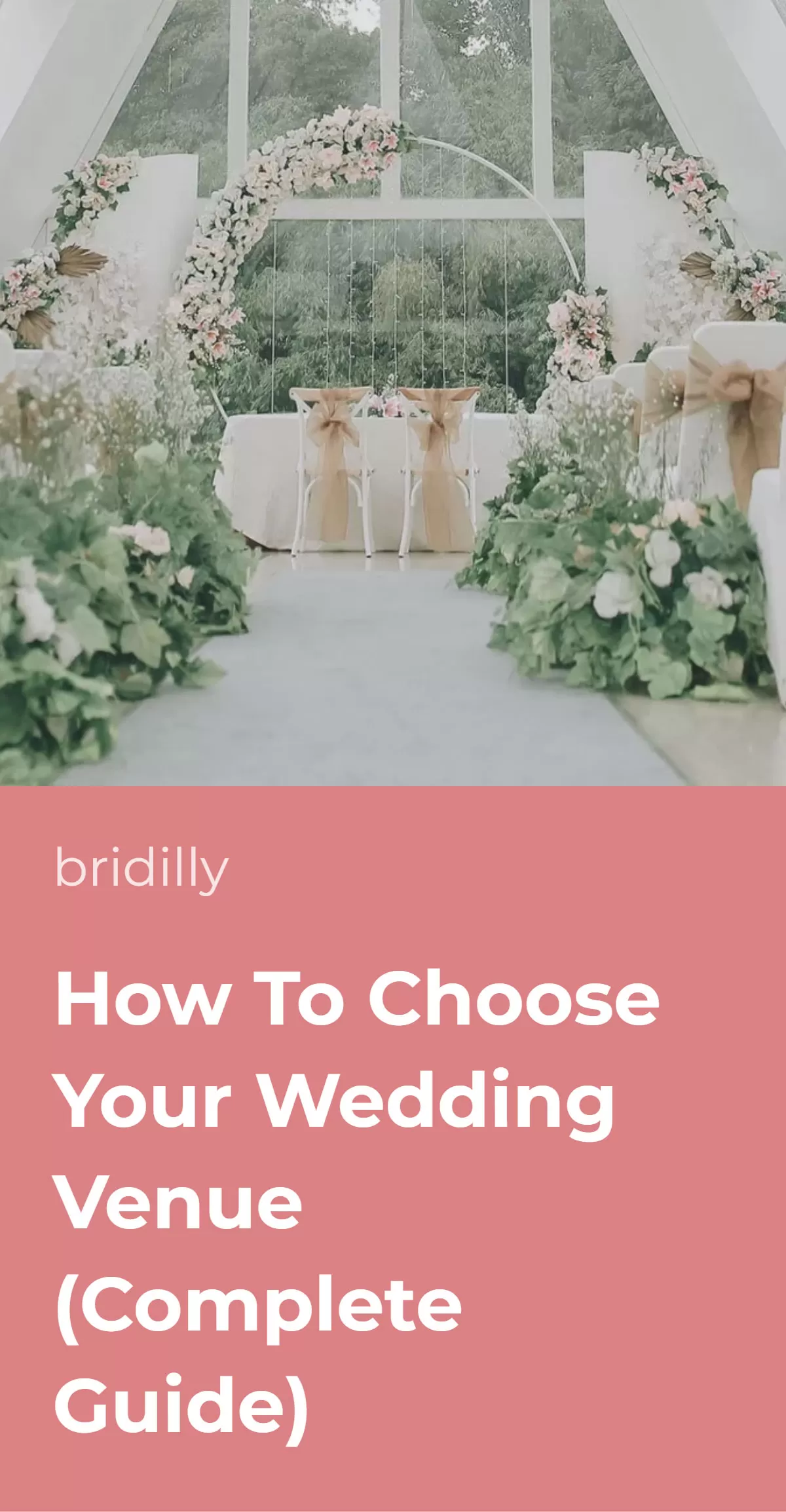Wedding planning is exciting, but couples often get confused about how to choose a wedding venue that meets their needs and preferences.
The selection of scenic places to tie the knot is astonishing, so picking the perfect venue is a challenging task.
So, how to find a wedding venue that aligns with your vision, accommodates the necessary guest count, and doesn’t cost a fortune?
The short answer is to define what you want precisely, do your research, attend several viewings, and know what questions to ask.
Additionally, you should know when to book the venue, ensure it’s accessible for all your guests, and clarify organizational points such as vendor availability.
Table of Contents [show]
Consider The Theme
Choosing your wedding theme before searching for a venue is vital to avoid cancelation fees associated with changes. Your venue’s interior is essential in your big day’s atmosphere.
A farmhouse isn’t an appropriate venue for a black-tie reception, just like a castle isn’t the best setting for a rustic wedding. Research popular wedding themes, consult with your partner and draw inspiration to choose the right venue.
The best venue ideas for a rustic wedding include barns, farmhouses, manor houses, old mills, and ranches. If your wedding is scheduled for a warm month, consider outdoor venues in forests, meadows, or near the sea.
Traditional, formal weddings are typically held in sophisticated venues, such as a luxurious restaurant, hotel, destination resort, museum, or castle.
In contrast, alternative weddings require unconventional venues such as an old factory, alpaca farm, movie theater, or planetarium.
Finalize The Guest List
Finalizing the guest list is another crucial point to keep in mind before you choose your venue. A venue can only accommodate so many guests, and you should pick a space that is neither too small nor too large.
If your venue is too small, you may have to uninvite some guests, and if it’s too large, you will pay unnecessary much for space you don’t use, and the venue may seem empty. On the other hand, you get extra dance space.
Numerous factors can affect the wedding guest count, from budget changes to flight cancellations and personal reasons.
Of course, you will only find out the exact guest count after receiving the RSVPs, which is too late to book a venue.
However, you should at least have a final invitation list ready and search for a venue that can accommodate your estimated guest count.
Another reason you should have a ready guest list before choosing the venue is accessibility and age restrictions. Not every venue is suitable for kids and impaired guests, so consider this point in advance.
Set The Budget
Budget typically is one of the deciding factors in choosing a wedding venue, and that’s no wonder – the venue usually accounts for about 30% of the total budget.
The average cost of a wedding venue in the U.S. is over $10,000, but the figure may vary depending on the couple’s priorities, preferences, location, season, and other factors.
Research wedding venue prices in your area to spot the best deals. Thankfully, in most cases, couples can negotiate the venue fees if they know how to behave and have sufficient knowledge about competitor prices.
Splurging more on a luxurious venue may be tempting, but stick with your budget when picking your options.
Remember that venue isn’t the only important wedding feature – you will also have to pay for food, drinks, attire, and entertainment.
Consider The Location & Weather
Many couples don’t choose their wedding venue until about six months before the big day. However, you should decide on the state and town at least nine months before the big day because you need to mention it on your save-the-dates.
Firstly, destination weddings have a different timeline and require earlier venue booking. Secondly, your guests need to clear their schedules, get days off from work, and book transport tickets and accommodation if they live out of town.
Lastly, choosing the state will help you narrow down the venue selection. When picking the location, consider how easily you and your guests can get there, the weather, and the prices.
For instance, you may dream of tying the knot on a tropical island, but will your guests be able to get there at their own expense? Can they get sufficient vacation time? Can you afford a destination wedding?
Or, suppose you’re a nature lover and want to get married outdoors. Winter woods are gorgeous, but won’t your guests get cold during the ceremony? Extreme summer heat isn’t favorable for outdoor weddings either.
Make a Checklist
The wide variety of available wedding venues may be overwhelming. Each option has its pros, but how to pick a wedding venue that fits your vision, wedding style, budget, guest count, and other needs and preferences?
Make a checklist before starting your research. Include all points you consider significant, from major ones like the price and style to more specific details such as parking place availability, accessibility, furniture rentals, or public transport nearby.
Indicate which points are non-negotiable and which can be compromised. Then, start researching your options and mark which of your needs and preferences every venue meets and which do not. In the end, count which venue scored the most points.
However, don’t forget to follow your heart. Sometimes, you may lean towards a specific venue despite it not being the best option from a practical standpoint, and that’s alright.
Do You Pick The Venue or The Date First?
A question that boggles the minds of many couples who’ve just started wedding planning is – do you pick the venue or the date first? The simple answer is – either.
If you want to tie the knot at a specific place, you may pick the date based on its availability and price in certain seasons. On the other hand, pick a date first if you prefer a particular season but aren’t sure about the venue.
Venue Viewings – Importance & Etiquette
Never pick a venue based solely on pictures. You’d be surprised to learn how many tricks professional photographers use to make venues look more spacious and beautiful. Furthermore, photos never showcase the venue’s pitfalls.
Make a list of your venue favorites and schedule multiple appointments. Don’t feel guilty for not booking a venue right after a viewing – visiting several venues before deciding is normal.
Bring your venue checklist to the viewing to keep track of all critical points. Apart from the essential checklist, create a list of questions to ask the wedding venue manager and ensure you don’t miss any.
You may take pictures, but only if the venue manager allows it. Bring your credit card along because the best places are in high demand and often are booked for 12-18 months ahead.
The wedding venue viewing etiquette is simple – don’t bring too many people, don’t be pushy when negotiating, and don’t change your mind after placing the deposit unless for a justifiable reason.
Ask What’s Included in The Venue Cost
Ask the manager what’s included in the wedding venue cost during your viewing appointment or initial email communication. Breaking down the total cost into specific fees helps to determine the deal’s actual value and negotiate the price.
Some venues charge a flat fee regardless of the guest count and time; others charge an hourly or per-guest fee. You should also find out about any extra fees, e.g., parking, cleaning, or insurance, because they can quickly add up.
Ask whether the venue offers furniture, tableware, decoration rentals, security, help in decoration, and catering.
Sometimes, a deal’s value isn’t apparent – a more expensive venue may actually be more beneficial because it provides more perks than a cheaper venue that offers nothing but space.
Other Questions To Ask The Venue
The questions to ask a wedding venue don’t end with essential points such as the maximum guest count, pricing, and availability. Frankly, even questions related to these primary points aren’t always apparent.
Ask the venue manager how far in advance you should reserve the date, what’s the payment schedule, whether venue rates differ by season and day of the week, and what are the cancellation fees and return policy.
Then, ask organizational questions. Find out whether the venue provides help in decorating, whether they have a list of approved vendors, and how much time they give for setting up and breaking down the decorations.
Ensure that the venue is handicap accessible if any of your guests are impaired and child-friendly if you plan to invite families with kids. Some venues also have noise restrictions, which is crucial if you plan to bring in a DJ or band.
Ask about the parking, electric outlet, and restroom availability, hotels and transport nearby, and kitchen setup.
Some venues have the necessary equipment to store and prepare reception food, while others require caterers to use portable fridges and prepare food in advance.
The list of questions to ask the venue manager before booking can go on. Consider your event specifics, special needs, and preferences to create a list of questions.
Remember that there are never too many questions – it’s best to clarify every point in advance than to deal with problems after booking.













No Comments Add one
Leave a Comment